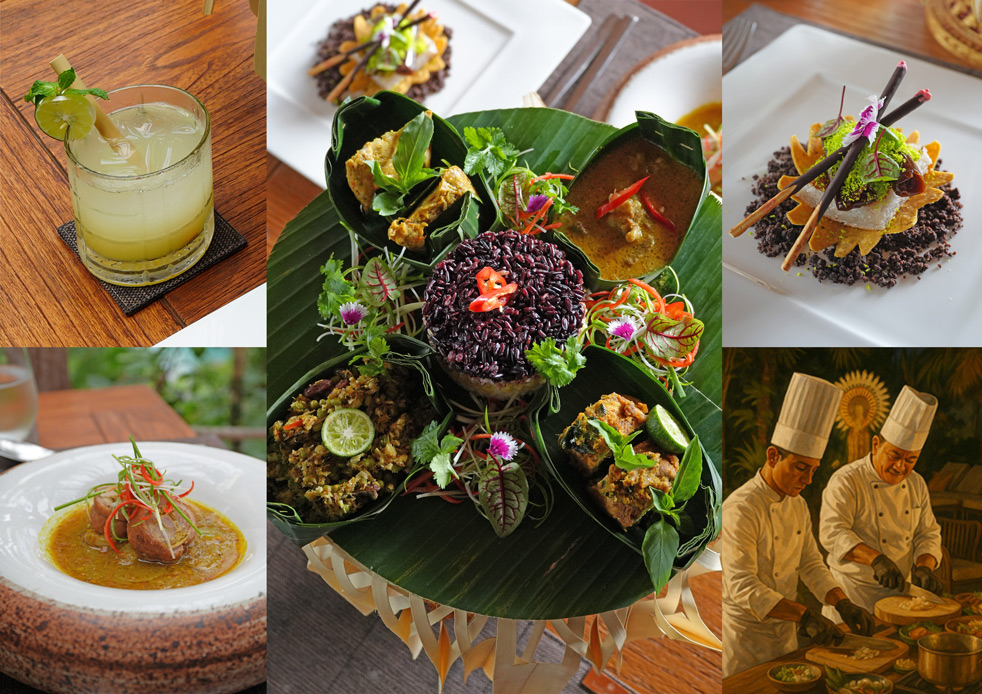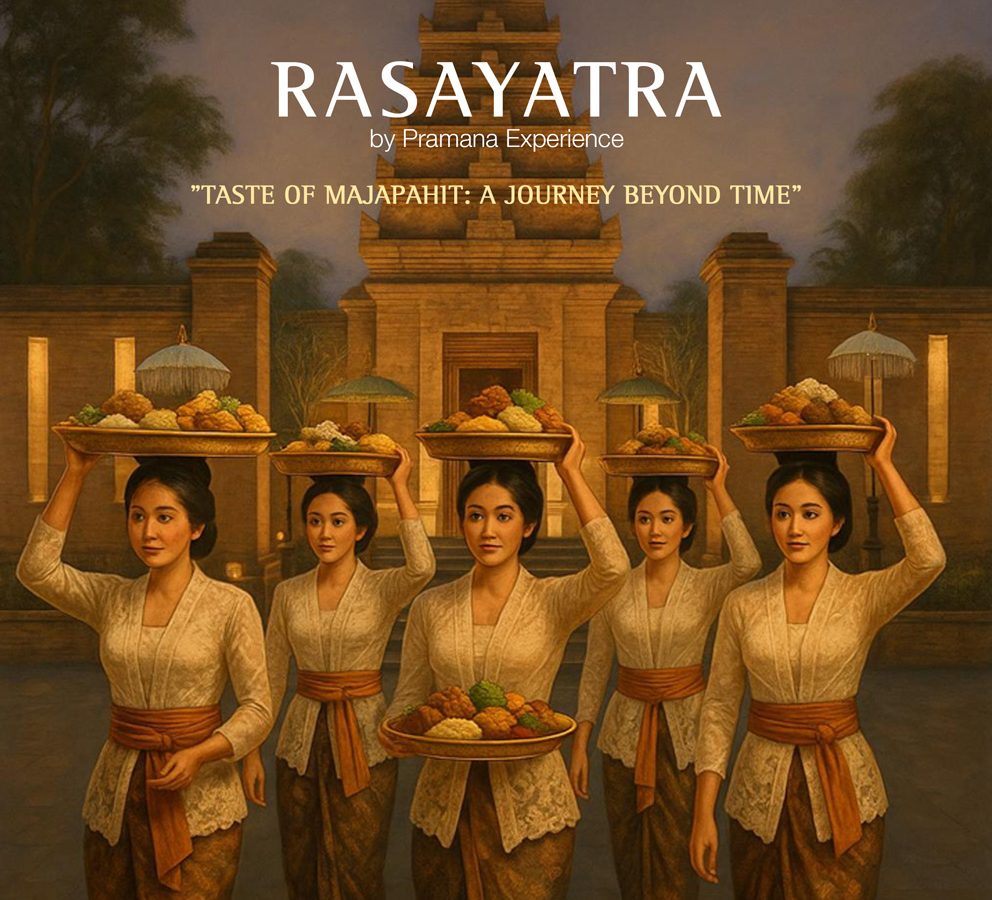TASTE OF MAJAPAHIT: A JOURNEY BEYOND TIME
Rasayatra returns with a refined cultural and culinary celebration, reviving the rich legacy of one of Nusantara’s most illustrious kingdoms. Through meticulously layered spices and artfully crafted dishes, each bite unveils a narrative each course a tribute to the depth, elegance, and spirit of Majapahit’s royal gastronomy. An evocative journey of taste that transcends time, bridging the royal kitchens of the past with the refined dining tables of today.
Introduction
Pramana Experience is a hospitality management company with 12 years of experience, overseeing more than 70 properties including resorts, hotels, villas, and restaurants across Bali and other selected destinations. Rooted in a philosophy of local culture, sustainability, and sincere hospitality, Pramana Experience offers soulful stays. Each property is designed not merely as a place to rest, but as a space to authentically connect with Bali’s natural beauty and cultural heritage.
Rasayatra is the signature culinary program of Pramana Experience—a cultural preservation initiative that offers guests an unforgettable gastronomic journey. Inspired by the flavors of the past, Rasayatra revives ancient recipes rich in philosophy and spiritual meaning. Presented in an atmosphere of grandeur and historical storytelling, this program invites guests to savor not just food, but the meaning, stories, and cultural wisdom behind each dish—a journey of taste that bridges the past with the present moment.
Menu Story
SIDHU SITA (drink)
This refreshing sugarcane-based beverage is more than just a palate cleanser—it is a ritual legacy from the royal courts, with roots tracing back to the 8th century. References to this drink can be found in ancient Javanese inscriptions and temple reliefs, where it was served as part of ceremonial offerings.
JUKUT HARSYAM
A fragrant soup of young banana blossom and rolled duck in a spiced broth, reflecting the philosophy of harmony between body and nature in Javanese and Balinese culture. The word “jukut”, originating from the Majapahit era and later embraced in Bali, refers to a vegetable-based broth believed to cool and balance the body on a spiritual level. Duck, the main element, holds royal symbolism—an animal that thrives on both land and water, representing balance between the physical and the spiritual realms. The use of basa gede spice paste, lemongrass, and kaffir lime leaves is rooted in royal kitchens, once reserved to enhance vitality and immunity among nobility
SARWA WEAS
A rich lamb leg curry simmered in coconut milk—an adaptation of cooking techniques brought from Gujarat and Persia during the Singhasari–Majapahit trade era. This dish served as a symbol of strength and elevated social status, typically presented at noble feasts and royal banquets.
CARUBAN HAYUYU
Derived from the word “carub” meaning “to mix,” this dish reflects the cultural diversity of the Majapahit Empire as the archipelago’s unifier. Composed of vegetables and banana blossom, it represents the bounty of the land offered in reverence to the king and ancestors, echoing the tradition of dharmadaksina ceremonial offerings.
KLAN WDUS
A rich lamb leg curry simmered in coconut milk—an adaptation of cooking techniques brought from Gujarat and Persia during the Singhasari–Majapahit trade era. This dish served as a symbol of strength and elevated social status, typically presented at noble feasts and royal banquets.
BOTOK HURANG
Botok dishes have been known since ancient Javanese times. The tradition of wrapping spices and shrimp in banana leaves symbolizes purity and the unification of flavor. The banana leaf serves as a spiritual vessel, believed to harmonize with the natural elements.
AJUMAN SUDHA RASA (A Sweet Finale Full of Meaning)
This dessert serves as a symbolic offering of gratitude and the culmination of flavor.
• Jaja uli and tape are traditional fermented delicacies from Java and Bali, often featured in harvest festivals and wedding ceremonies.
• Dwaldwal or dodol is a sweet delicacy inherited from the royal cuisines of the Sriwijaya and Majapahit empires. It was traditionally served as tambul—a closing dish shared by the people and the king during the sacred Manusuk Sima ceremony.

Summary of Historical Sources
Most of the foods from the Majapahit era are mentioned in inscriptions of Sima land grants, which were royal decrees exempting certain villages from taxes as a reward for their service to the kingdom. These foods also appear in the Nagarakertagama, particularly in descriptions of royal ceremonies and events.
After the proclamation ceremony of a newly granted tax-free region (perdikan), the witnesses were asked to relocate. Everyone sat in the alun-alun (central courtyard) in accordance with their social status—high, middle, or lower ranks. Naturally, the king sat upon a throne positioned higher than the rest, surrounded by palace officials.
At the center of the courtyard, a lavish array of food and drink had been laid out: there were nasi tumpeng (conical rice mound known as skul or paripurna), side dishes such as dried meat, various types of venison, chicken, marine and freshwater fish, soupy vegetable dishes, fresh salads such as keluban (seasoned vegetables), banana heart, pancakes (kue dadal), and a variety of both soft and alcoholic drinks (tuak, kilang).
(Source: Sima Land Grant Inscriptions)
Negarakertagama
In the Nagarakertagama, the mention of food includes:
• Canto 89, Verse 5: Dishes consisting of goat meat, buffalo, birds, venison, honey, fish, eggs, and sheep.
• Canto 90, Verse 1: Feasts were prepared for the masses. The food was abundant and delicious. A wide variety of sea and pond fish were served promptly as part of the ceremonial sequence.
• Verse 3: A flowing abundance of refreshing alcoholic beverages: tuak nyiur (coconut toddy), tal, arak kilang, and tuak rumbya. These were the main drinks of the celebration.
Other Sources: Temple reliefs from ancient Javanese sites, Kudadu Inscription, Sukamerta
Inscription, Balawi Inscription.
Perfect sharing for two peoples IDR600++
Available from May 31st to August 31st, 2025




